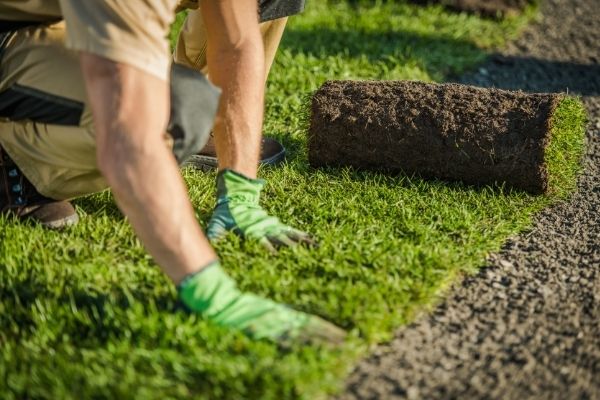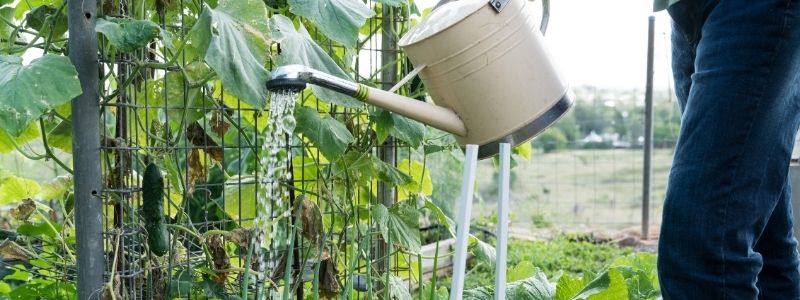Liquid vs. Solid Fertilizer
Why should I fertilise?
Fertilising your plants is one of the most important things you can do for the longevity of your garden.
Plants that are fertilised properly receive the vital nutrients they need to keep growing and produce fruit, whereas plants that aren’t fertilised may struggle to grow and thrive.
With many different types of plant fertilisers available, choosing a fertiliser that is right for your plants will ensure that they grow to be strong and healthy.
Determining which type of fertiliser is best depends on the specific needs of your plants.

Fertiliser is split up into two different categories, with many varieties within these categories. Making the decision between liquid fertiliser vs. solid for your garden really depends on the needs of your plants, including whether or not they have nutrient deficiencies.
Liquid and solid fertilisers supply different nutrients to plants, which makes choosing the right fertiliser one of the most important decisions you will make.
Liquid or Solid fertiliser?
Liquid Fertiliser
Liquid fertilisers are high in essential nutrients including nitrogen, iron, phosphorus and potassium, and come in organic and inorganic forms.
Gardeners who seek out organic liquid fertilisers add extra benefits to their plants, in the form of natural fungi, bacteria and organic matter to the soil.
In contrast, inorganic liquid fertilisers offer plants every nutrient they need in concentrated forms, which has its benefits.

Being liquid, these fertilisers are absorbed quickly into the roots or leaves of plants as the fertiliser doesn’t need to be broken down.
This means that your plants receive the nutrients they need almost immediately, quickly correcting any nutrient deficiencies they may have. Liquid fertilisers ensure that plants get a quick and overall boost to help encourage growth.
Solid Fertiliser
Solid fertilisers offer a much slower release of nutrients than liquid fertilisers. Being solid, these fertilisers must be broken down in the soil, usually by temperature, rain or bacteria, which can sometimes take up to a year depending on the type of fertiliser.

Solid fertilisers offer major advantages for gardeners who want to feed their plants slowly but consistently over a whole season, rather than in quick and highly concentrated bursts.
Additionally, solid fertilisers are available in a variety of different sizes and textures, including powders to uniform prills, meaning they can be spread all over the garden.
Plants That Like Liquid Fertiliser
As different plants have different needs, some will be more suited to liquid fertiliser rather than solid. Some plants that like liquid fertiliser include:
Fruits & Vegetables
Liquid fertilisers work wonders on fast-growing fruit and vegetable plants, however we recommend using organic fertilisers rather than inorganic.

This is to ensure that when eating your delicious and healthy produce, you avoid any chemicals that may not be good for you. Organic liquid fertilisers quickly release the nutrients your fruit and vegetable plants need, providing a much needed boost in peak growing seasons.
Indoor Plants
Indoor plants also benefit from organic liquid fertilisers, as these fertilisers promote extra microbial activity in the soil that may be harder to stimulate in an indoor environment.

Inorganic liquid fertilisers are also helpful for indoor plants, as you can ensure higher concentrations of phosphorus are added to flowering plants, and higher concentrations of nitrogen are added to green, non-flowering plants.
Plants That Like Solid Fertiliser
Plants that prefer solid fertilisers benefit from a slower release of nutrients. Some of these plants include:
Mature Trees
Mature trees survive best when there is a consistent and slow release of nutrients into the soil, which makes solid fertiliser the right choice for mature plants.

Whilst mature trees are often able to survive with little-to-no fertiliser at all, fertiliser helps mature trees remain healthy well into the future, ensuring they last as a focal point in your garden for years to come.
Turf Grasses
For even the most experienced gardeners, it can often be difficult to keep turf grasses healthy year-round.
Turf grasses benefit most from slow release fertilisers as they need to be consistently provided with nutrients as the year progresses. Slow release fertilisers ensure that your grass has what it needs to survive harsh Australian climates.

Help Your Plants Grow
Choosing the right fertiliser will do wonders for your plants and garden. Garden Express stocks a large variety of fertilisers to suit the needs of almost every plant in your garden.
Browse our store online or call us on 1300 606 242 to have a chat about your fertiliser needs.








Comments are closed.